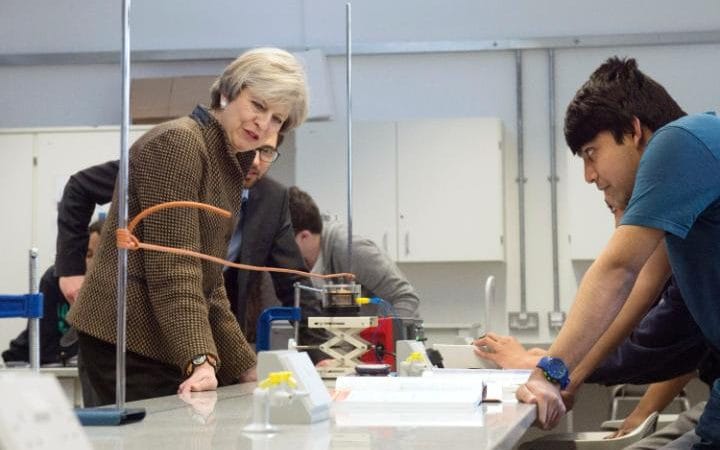London – British Prime Minister Theresa May announced she has a “personal mission” to increase the capacity and diversity of the school system which is divided into two categories: poor pupils in free official schools and rich in private and grammar schools who graduate to join elite universities afterwards.
The PM announced the new “Spring Budget” will provide$635 million to free schools so that they will continue to open into the next Parliament’s term.
The budget will fund up to 140 new schools, creating well over 70,000 new places, to take the total number of them to more than 800.
“But to give every young person in Britain the best possible start in life also requires a solid ground in academic subjects from the very beginning. So this Spring Budget will continue my mission to make Britain the world’s great meritocracy with a good school place for every child,” May announced.
Many of those schools could be selective as they will open when May’s major grammar schools expansion kicks in starting 2020. The plan for the schools, which are independent of local authorities, will also include payment for the public transport fees or the allocation of minibuses for kids from struggling families to go to grammar schools that are between two and fifteen miles from their homes.
The help will be made available to children on free school meals or whose parents claim the Maximum Working Tax Credit.
May hopes the schools will provide education to all students of all social statuses, adding that: “The brutal and unacceptable truth is that for far too many children in ordinary working class families, the chance they have in life is determined by where they live or how much money their parents have.”
The latest budget set for the education program includes $270 million set aside to rebuild and refurbish existing schools to meet the 21st century requirements.
This step comes as the UK prepares to leave the European Union and aims to show that the country will be more concerned with local issues like education and health.
May added that the current educational system decides that children’s future is “based on house prices and parental income, because when you are working two jobs and struggling to make ends meet, it is no good being told that you can choose a better school for your children by moving to a different area or paying to go private. These are not choices you can make – and they are not choices you should have to make.”
According to May, the new budget will remove the barriers that prevent more good faith-based free schools from opening, and it will enable the creation of new selective free schools so that the most academically-gifted children get the specialist support to fulfill their potential regardless of their family income or background.
The government will publish the reform plan in the coming few weeks in what it called the “White Paper” during which its details will be explained. The government hopes this will end the ban posed by the Labor Party on establishing new grammar schools which has been effective since 1998.
The Budget is still considered limited as it will create 70,000 new places at the schools compared to 8.4 million in current schools. However, the Budget will confirm the government is pressing ahead with opening a total of 500 new free schools by September 2020, with 30 more on the way and a further 110 in the next Parliament.
May will today defy fierce criticism of huge waste in the “free schools” program with the Labor accusing the government of “throwing more good money after bad” while the Liberal Democrats described it as an unbelievable decision in the face of “devastating cuts to school budgets”. Conservatives believe that spending the money on all British schools will be more beneficial than just on private grammar schools.
Britain’s grammar schools are considered one of the oldest educational systems in the country dating back to the middle ages, where they specialized in Latin. Other specialties, like languages, math, history and geography were later added. It is considered a specialized academic school and provides better results than regular high schools in the UK.
During the Victorian age, grammar schools were reorganized in Britain and Wales, while Scotland developed its own educational system.
During the 1960s, some grammar schools chose to turn into independent private schools, while others were integrated with comprehensive schools and became part of the public system.
There are only about 163 grammar schools in England and a further 69 grammar schools in Northern Ireland.
